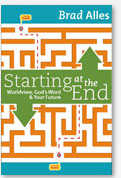
Continuing to follow the literal Genesis account of creation (Genesis 1:1-2:3), which is what Professor Barr said the text is intending to convey, the sequence of days and their created elements are as follows. On day one, God made a watery, formless mass along with light, but this light was not the sun. (More on that later.)
On day two, God formed the earth entirely out of the water and added an atmosphere that separated either clouds or a possible extra layer of water vapor above this watery planet. Some creationists believe that this extra atmospheric layer would provide certain benefits to life on the planet. It would create a greenhouse effect for a warmer climate all over, and block harmful radiation for longer life. This would explain why people in the Genesis genealogies lived so long before the Flood—the environment was much different (and better!) than it is today.
On day three, God made land and plants. On day four, God made the sun, moon, and the stars. Recall on day one, God created light. It was not the sun; the Hebrew word is simply “light”. What was this light? No one knows. But on day four, God forms the sun. Notice how God created the sun after the plants had already been created on day three. Why did God do that? Perhaps it was to show that God gives life, not the sun. Many cultures later would worship the sun and have their “sun-god”; however, God gives life, not the sun, and possibly this is why the sequence is plants on day three and then the sun on day four.
On day five, God made fish and birds. And finally, on day six, God made land animals as well as Adam and Eve. In Genesis 1:26, the Triune God, Father, Son, and Holy Spirit, spoke when “they” said, “Let us make man in our image and in our likeness.” The phrase, the “image and likeness of God” means Adam and Eve were made righteous and holy. They were made in God’s spiritual image, not physical appearance, since God is a spirit as Jesus said in John 4:24.
On the seventh day, God rested from his creative work. The word doesn’t mean He was tired; He was just finished! He also made it holy, and proclaimed later that Israel should not work on the Sabbath—“for in six days the LORD made the heavens and the earth, and on the seventh day he abstained from work and rested” (Exodus 31:17). Here’s another verse that speaks of a literal six-day creation. And this is why we have seven-day weeks even today!
Learn how to defend your Christian Faith

Big Questions Biblical Answers Supplemental Materials
by Brad Alles
- September 2022
- August 2022
- July 2022
- June 2022
- May 2022
- April 2022
- March 2022
- February 2022
- January 2022
- December 2021
- November 2021
- October 2021
- September 2021
- August 2021
- July 2021
- June 2021
- May 2021
- April 2021
- March 2021
- February 2021
- January 2021
- December 2020
- November 2020
- October 2020
- September 2020
- August 2020
- July 2020
- June 2020
- May 2020
- April 2020
- March 2020
- February 2020
- January 2020
- December 2019
- November 2019
- October 2019
- September 2019
- August 2019
- July 2019
- June 2019
- May 2019
- April 2019
- March 2019
- February 2019
- January 2019
- December 2018
- November 2018
- October 2018
- September 2018
- August 2018
- July 2018
- June 2018
- May 2018
- April 2018
- March 2018
- February 2018
- January 2018
- December 2017
- November 2017
- October 2017
- September 2017
- August 2017
- July 2017
- June 2017
- May 2017
- April 2017
- March 2017
- February 2017
- January 2017
- December 2016
- November 2016
- October 2016
- September 2016
- August 2016
- July 2016
- June 2016
- May 2016
- April 2016
- March 2016
- February 2016
- January 2016
- December 2015
- November 2015
- October 2015
- September 2015
- August 2015
- July 2015
- May 2015
- April 2015
- March 2015
- February 2015
- January 2015
- December 2014
- November 2014
- October 2014
- September 2014
- August 2014
- July 2014
- June 2014
- May 2014
- April 2014
- March 2014
- February 2014
- January 2014
- December 2013
- November 2013
- October 2013
- September 2013
- August 2013
- July 2013
- June 2013
- May 2013
- April 2013
- March 2013
- February 2013
- January 2013
- December 2012
- November 2012
- October 2012
- September 2012
- August 2012
- July 2012
- June 2012
- May 2012
- April 2012
- March 2012
- February 2012
- January 2012














Comments are closed.